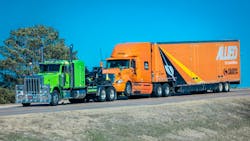This is part one of a two-part story on how to identify predatory towing and guarding fleets against the greedy practice. Read part two here.
As trucking interests work to cut down on roadside responders preying on carriers and drivers who find themselves in a bind on the job, fleets that educate themselves on predatory towing practices will be equipped to contest exorbitant charges. Avoiding the headaches and the excessive costs from greedy predatory practices starts with knowing what enables these practices, how to spot an excessive invoice, and ultimately prevent the towing company from demanding a ransom for equipment and cargo.
“This has become a national problem—so much so that the American Transportation Research Institute just published a study called Causes and Countermeasures of Predatory Towing,” Gene Funk, VP of safety and general counsel at Cowan Systems, a Maryland-based trucking company, said in a recent webinar hosted by the Truckload Carriers Association.
“Their conclusions were kind of shocking,” Funk continued. “They found that 30% of the invoices that they surveyed from trucking companies contained excessive charges ... They found out that around 80% or so of motor carriers had received invoices that had excessive charges on them, so it's a big problem.”
Cowan Systems (No. 62 on the 2023 FleetOwner 500: For-Hire list) operates nationwide, which leads drivers and their cargo into unfamiliar territory. In the event of an accident where a tow is required, companies like Cowan may not have a trusted tow provider in the area, which leaves Cowan–and other national trucking companies–at risk of being preyed upon by towing companies looking to squeeze thousands of dollars from trucking companies through predatory practices.
Why does predatory towing happen?
Renee Bowen, a Maryland attorney and Trucking Industry Defense Association member, outlined multiple reasons why it’s easy for these towing companies to take advantage of trucking companies and their drivers.
Time is of the essence in the trucking industry. The quicker drivers can deliver loads, the more loads they can haul, which brings in more money. Carriers are also accountable to their shipping partners and customers who are relying on the trucks to deliver goods on time. Towing companies know this and use it to their advantage by holding a truck or cargo “hostage” until the trucking company pays that excessive towing invoice to release their cargo, Bowen said in the same webinar. This predatory hostage practice ensures the towing company has all the power.
“They’ve got all the negotiation power,” Bowen stated. “They are trying to capitalize off of your need to get your vehicle and your cargo back quickly, and they know that you need to get it back quickly. They're counting on you paying the invoice quickly so that you can get everything back.”
See also: Predatory towing can more than double fleet costs
Towing companies also get away with these predatory practices because there are “no uniform regulatory schemes'' for them to abide by, she explained. Towing regulations will differ by jurisdiction. This means regulations differ from state to state, county to county, and city to city. And there are some jurisdictions with no towing regulations in place at all.
No regulation is effective without enforcement, and Bowen said that’s another reason predatory towing events continue. In Bowen’s experience, after reaching out to enforcement agencies about predatory practices, police said they can’t interfere because it’s a “civil matter.”
Bowen also said that companies get away with predatory towing and excessive invoices because of a lack of communication. Multiple entities can be involved in a single tow event, including the motor carrier, the shipper, the broker, and the insurance agencies for each party; so the tow companies try “to capitalize on the chaos with so many different people involved,” Bowen said.
“(These towing companies are) holding the tractor-trailer and the cargo, and they're demanding ransom payments from everyone involved,” Bowen explained. “They're demanding it from the owners of the cargo of the equipment. They're demanding it from the insurance carriers that are involved—whether it's the cargo insurance, the physical damage insurance, the liability insurance. They're demanding payments from the drivers themselves—I've seen that happen.”
In one instance, Bowen recalled a towing company sent the same invoice to two insurance companies, both of which paid.
How to identify predatory towing practices
Just as there are multiple reasons predatory towing continues to happen, there are multiple ways a towing company can incur those excessive charges. Trucking companies that suspect they’ve received an excessive invoice should start by carefully reviewing it, Bowen suggested.
Check the towing invoice
Fleets should review the invoice to indicate whether they were charged per pound. Bowen said this is the first indicator that predatory towing is at play. In Maryland, where Bowen practices law, per-pound billing for a tow is against the law. Outside of Maryland, Bowen said per-pound billing is an indicator of an excessive invoice because per-pound billing often has no relation to the amount of work a towing company performed.
Funk agreed that per-pound billing indicates an excessive invoice; he’s seen instances where a tow company will charge for an 80,000-lb. vehicle whether it weighed 80,000 lb. or 20,000 lb.
Look for excessive surcharges
Another indicator of an excessive tow invoice is a surcharge. Bowen has seen invoices with a weather surcharge when a tow occurred on a sunny, 80-degree day. She’s also seen charges for “concessions” and snacks for tow operators while on the scene. Some tow companies will also charge for photographs taken on the scene; others will charge a communication fee.
One towing company “charged $50 every time they picked up the phone to chat with either the insurance carrier or the motor carrier,” Bowen said.
See also: Turning learning into trucking success
Other towing charges to scrutinize
How a tow company presents its rates can indicate if it’s preying on a fleet. Bowen advised fleets to check if the invoice indicates an excessive hourly rate, such as if the company has hourly minimums that they charge no matter how long the tow takes.
What about personnel charges? Does the invoice indicate a charge for tow operators not on the scene? Fleet owners should also look at equipment charges and whether they are invoiced for equipment not used to complete the tow.
“There's no there's no justification, there's no law, and there's no regulation in almost any state in the country that allows the towing company to make up minimum charges, or administrative fees, or any of these other things,” Funk said. “They just do it, and they think they can do it because they've got your equipment, and they're holding it hostage.”
About the Author
Jade Brasher
Senior Editor Jade Brasher has covered vocational trucking and fleets since 2018. A graduate of The University of Alabama with a degree in journalism, Jade enjoys telling stories about the people behind the wheel and the intricate processes of the ever-evolving trucking industry.

